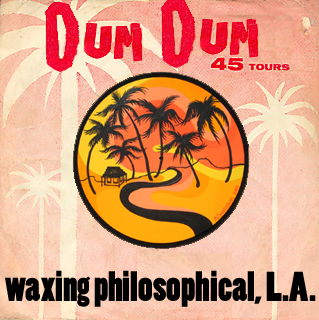“Waxing Philosophical, L.A.” is DUM DUM’s biweekly column written by Christina Gubala, co-founder of L.A.’s premier cassette-tape label, Complicated Dance Steps. A die-hard vinyl collector, you can find her spinning records at local bars near you.
Our city has a continuing history thick with vinyl love, now more than ever with record shops opening their doors instead of shuttering. Each week, Gubala breaks down a fresh new wax purchase, and writes about the record store as well, mapping it as part of L.A.’s history in the making.
After stoking my record-craving fire by attending John Weise: 100 Seven Inch Records at Family, I ambled a few doors south on Fairfax to Turntable Lab, the electronics store of which dreams are made. Turntable Lab is every bit as sleek and precise as its name would imply. Sensual lighting and modest yet classic wooden shelving create the illusion of a blank canvas, like the white walls of a freshly-painted art gallery. Upon each shelf and within each case, however, the art unfurls.
Meticulously calibrated DJ headphones adorned with precious metals, the most cutting edge editions of Serato decks and mixers, a stylus for any turntable imaginable. Instruments of audio appreciation pose like models, gorgeous in their functionality. It’s an intimidating sight for any aspiring DJ orienting themselves to the possibilities, as well it should be.
They conceptualized the brand in 2001, the brainchild of three New York-based DJs and music producers who had become fed up with buying overpriced equipment from ill-informed salespeople at chain stores. After establishing their business model and reputation in New York, they opened what’s referred to as their flagship store here in L.A. in December 2005. They stock fashion obviously informed by New York efficiency, books about Banksy, and ooze How To Make It In America-esque dedication to their aesthetic. But what of the record stock?
A store with such a keen focus on the intake of sound sets a very high bar for itself. Walking through the front door, images of Q-Tip and J. Dilla wafted through my imagination and I found myself uncharacteristically shy. I will be the first to admit that my hip-hop knowledge is sorely lacking due to an early aversion, so I B-lined straight for the reggae section, not making eye contact with anyone or anything until I got there. Althea & Donna grinned back at me readily, an auspicious indicator that Turntable Lab had some treasures for me yet. The care with which they’d curated the entire store throbbed through the reggae section. Each record looked extraordinary in its thick plastic wrapper, with bright marquee covers boasting all-star teams of drum and bass masters. A King Tubby compilation with a bright indigo cover caught my eye, and I decided to take it as an opportunity to get to know the store a little more personally.
I made my way back to the front counter, where 2 clerks soundtracked the evening. I felt out of my element, exploring an alternate take on a culture I knew well, but the gentlemen working wouldn’t allow my awkwardness to permeate. Their instant friendliness could have set anyone at ease, and that’s when I realized what made Turntable Lab work: the employees are tellingly in love with their work. I tossed a few questions their way, and each was met with an abundant, knowledgeable response. When I mentioned the King Tubby compilation I had spotted, one of them replied, “Oh YEAH! That’s a good one, and we certainly don’t see it come through very often!” Even though the $11 price tag had already sold me, I let him convince me further; he ran to grab the record and gave it a long look, pointing out his jams of choice. Any intimidation I had conjured as a consequence of my own self-consciousness evaporated and I shook the man’s hand as he processed my transaction.
King Tubby’s Lost Treasures, a 2001 compilation of unreleased King Tubby dub jams, was mine. While I assumed it was going to be the kind of dub-stravaganza that comprises my dreams, the wanton sexiness of this record staggered me. For those unfamiliar with the King, he is hailed as the inventor of the dub aesthetic, and when I was first finding my way around reggae history, I was told that I couldn’t go wrong with anything he did. This compilation proved this to be true once again. The opening track, “Cherry Dub”, takes Eric Donaldson’s “Cherry O Baby” and snips it into vocal scraps suspended in a rhythm pudding. Cornell Campbell, Dennis Wilson, Barry Brown, and Ronnie Davis all receive the same treatment as the record progresses, and yet each track sounds sultry and calculated.
Tubby is able to distill the personalities of each of these musicians so that they are the focal points of each track, despite their sparse presence. It’s something rare in re-edited music, and he makes it seem effortless. I listened to “Dub Confession” (featuring a sample of Johnny Clarke’s “Every Knee Shall Bow”) multiple times at various speeds, and in every incarnation it maintained its richness. Lost treasure indeed–this record hasn’t left my turntable since its purchase.
Turntable Lab is a chic, efficient store with massive soul power and an excellent selection of low-end heavy records. I can’t wait to return, and I can’t recommend their reggae section highly enough.
Tuesday, November 1, 2011







